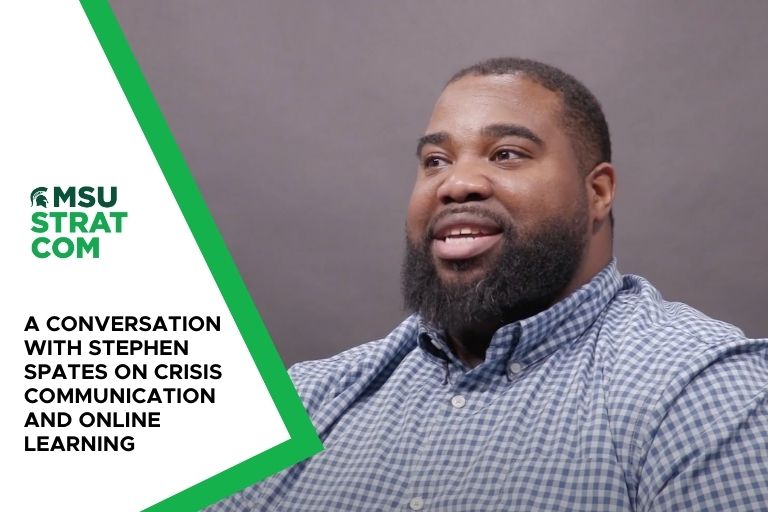Get more information about the StratCom program
We sat down with Stephen Spates, an instructor in the Michigan State University Strategic Communication Online M.A. program, to learn about his diverse background in communication, which encompasses both industry and academia experience. His journey has taken him from a small HBCU in northern Alabama to MSU, where his focus is on crisis communication. Spates discussed his career, the intersection of crisis management and communication, and his perspective on the evolving landscape of online learning.
A journey through communication
Spates’ journey began after high school when he attended a small HBCU in Huntsville, Alabama, earning a Bachelor of Arts in Communication with a minor in Management.
“I left home and went to a small HBCU in northern Alabama,” he said. “That experience was foundational in helping me decide where I wanted to go in my career.”
After earning his degree, Spates returned to Michigan, working in marketing for Lakeland Healthcare (now Corewell Health), before continuing his academic journey at Western Michigan University.
“I came back to Michigan to work for a bit, and then I pursued my master’s at Western Michigan University,” he said. His academic path then led him to the University of Tennessee, where he earned a Ph.D. in Communication and Information.
The intersection of crisis communication and research
A key theme in Spates’ research is crisis communication. His studies often explore organizational communication during times of crisis, a topic with broad practical implications across industries.
“My research focuses on crisis communication, which is incredibly relevant for organizations as they face vulnerabilities and unexpected challenges,” Spates said.
Spates has applied his research to real-world scenarios, including a recent project funded by the U.S. Department of Homeland Security.
“In 2023, I worked on a grant that looked at campaigns designed to reduce violence and terrorism,” he said. “This research connects directly to how organizations can communicate during crises, and I’m excited to bring that knowledge to the classroom.”
The importance of crisis readiness
When it comes to crisis communication, Spates believes every organization has vulnerabilities that can lead to crises, so preparation is key.
“Crisis is almost inevitable,” said Spates. “The important thing is that organizations recognize where they are vulnerable and start preparing in advance. That way, when crises hit, they’re ready to manage the situation effectively.”
Crises don’t always follow a predictable path
“Sometimes there’s no plan in place, but a crisis offers an opportunity for learning and growth. You learn from the experience and develop better strategies for the future,” Spates said. “In the end, crisis situations are opportunities to learn about leadership, organizational connections, and the relationship between an organization and its consumers.”
Teaching crisis communication
Spates has taught crisis communication at several institutions and now brings his expertise to the StratCom online program.
“When I had the chance to join Michigan State, I was really excited about teaching this course,” he said.
One of the primary lessons he shares with students is how to develop and execute a crisis communication plan.
“In a crisis, you often have very little time to get your plan in place. The ability to execute a plan under pressure is a crucial skill,” he said. Spates emphasized the importance of communication in high-stakes situations. “The messages you send during a crisis can make or break an organization’s reputation,” he said. “Being able to restore your credibility after a crisis is essential.”
The evolving landscape of online learning
As an instructor in an online program, Spates is passionate about the possibilities of digital education. He shared that he believes online learning can be just as impactful as in-person classes.
“The effort you put into an online course is just as important as in-person learning,” he said. “I believe online education can be just as impactful if you build a sense of community and connection.”
His teaching philosophy focuses on fostering that community.
“One of the key strategies I use is to connect with my students, to make the course an enjoyable and highly educational experience,” Spates said.
Through video-based lectures, live sessions, and discussion boards, he encourages interaction and engagement among his students.
The future of learning and crisis communication
Looking ahead, Spates believes that new technologies, such as AI and virtual reality, will shape the future of both learning and crisis communication.
“We’re moving toward a society where virtual and AI-based platforms will simulate in-person experiences,” he said. “For students, the focus will still be on connection, even if it’s through mediated devices.”
In the field of crisis communication, Spates sees these new technologies as potential advantages.
“Crisis professionals need to understand how to use these devices to their advantage. The more we know about how to leverage technology, the better we’ll be at managing crises and restoring credibility,” he said.
The value of strategic communication
Ultimately, Spates believes mastering crisis communication is crucial for anyone entering the field.
“Strategic communication during crises is a high-demand skill,” he said. “Organizations value individuals who can communicate effectively under pressure and handle internal and external audiences during a crisis.”
Spates’ perspective on crisis communication aligns perfectly with the objectives of the StratCom program.
“Learning to communicate strategically in a crisis is one of the most valuable skills an organization can have,” he said. “If you can handle a crisis well, you will be an asset to any team.”
Stephen Spates’ career is a testament to the power of communication, whether in times of crisis or in the evolving world of online education. His insights into crisis communication, coupled with his dedication to fostering community in online learning, make him a key figure in shaping the future of communication professionals here at MSU.
The Strategic Communication Online M.A. program at Michigan State University is an asynchronous, 100% online graduate degree designed to enhance your digital communications in all its forms demands to be integrated strategically in advertising, public relations and media. Learn more / Apply.
